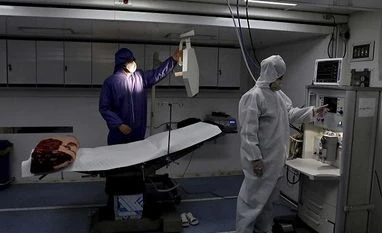A mammoth effort to become self-reliant in ventilators could have become a great ‘Make in India’ success story were it not for serious concerns being raised about the safety and quality of locally made machines.
JJ Hospital and St George’s Hospital in Mumbai have returned close to 100 ventilators for their failure to boost oxygen to the required levels in critical Covid-19 patients. The ventilators were made by a start-up, AgVa, with support from Maruti Suzuki over vendor development and component sourcing.
With a price tag of just Rs 1.5 lakh for the basic models as compared with Rs 10-15 lakh for an imported ventilator made them very attractive, particularly to smaller hospitals.
Around eight months ago, Ujala Cygnus Healthcare validated some of the AgVa ventilators and gave the company feedback on how to improve them. They were found to be useful for home use, ambulances and chronic patients, but not quite up to the mark for use on critical patients. Their teething problems were being sorted out.
Dr Shuchin Bajaj, founder & director, Ujala Cygnus Healthcare, said he though AgVa had made a good start. “The best is the enemy of the good as we always say. The good thing is its very low cost and how it works on a very simple platform. For organisations like ours which are focusing on low cost solutions in small towns, it is good,” said Dr Bajaj.
While AgVa did not answer queries sent to it, an industry insider said: “There is no question of profiteering or supplying sub-standard ventilators here.”
He said that the company had been making the ventilators for the last two to three years. “They used to make a few hundred machines in a month, and in the last few months they have scaled it up to almost 10,000 a month,” he said.
But news of the 100 ventilators returned by the Mumbai hospitals has some people worried. Many in the industry have called it a premature criticism of a homegrown product.
“Ventilators are a high precision product and it takes a lot of time to develop a perfect product. In such a short time these manufacturers have done a good job,” said Sunil Khurana, CEO, BPL Medical which has manufactured over 11,000 ventilators for the UK market during the Covid crisis.
Bajaj points out that while AgVa ventilators might not be adequate for severely critical patients, they can be used for less serious cases. Their use in homes also frees up capacity in hospitals.
“It costs one tenth of a similar ventilator so of course, it does not have all those bells and whistles but it’s not an iPhone. It's definitely like an Oppo and there is plenty you can do with it,” said Bajaj.
As India continues to fine-tune its long term strategy for coping with the virus, its capacity to make ventilators is rising. From making 300 a month in March, nearly 30,000 units are now made every month. In mid-May, the government allocated Rs 2,000 crore from the PM Cares Fund for Made in India ventilators.
Vishwaprasad Alva, founder and managing director of Skanray Technologies, said that in pre-Covid times, the domestic requirement was of 10,000 ventilators. About 9,000 were imported, despite the presence of local manufacturers.
Alva said his company’s ventilators are sold in Europe and in all these years he has not had a single complaint.
He claimed that some hospitals who have made allegations about poor quality are mixing up issues.
The industry also claims that the government made frequent changes to the specifications even after placing orders. One source said that many manufacturers rose up to the challenge out of a patriotic desire to help during an emergency but ‘now they feel harassed’.
Meanwhile, though, medical treatment of patients and the virus’ behaviour keep evolving. Fewer patients need ventilator support, prompting the government to stop procuring any more.
Hospital hospitals have plenty of spare capacity. For instance, in Fortis hospitals where there are 662 Covid-19 patients, only 26 are on ventilators. Doctors are managing well with high flow oxygen and non-invasive ventilators.
“We are a tertiary care hospital and so the patients who come to us are often much sicker. The ventilator shortage which was being raised back in March is not really an issue now,” said Dr B. Keshav Rao, head, medical operations group, Fortis Healthcare.
While it is unlikely that demand for ventilators will pick up, the fact that India can make low-cost ventilators at scale is something that those in the health care system feel is a positive development to emerge from the pandemic.
With India’s spare capacity, manufacturers are hoping they will be allowed to export. Maruti Suzuki India chairman R C Bhargava said that if allowed to export now, it could be one of India's biggest Make in India success stories.
Unlike PPEs and masks, he said, there can be no sustained demand for these high-end machines, therefore local manufacturers who have built capacities in the last two months should be allowed to explore the international market.
"It will also be a learning experience for them if they end up upgrading their machines according to the specifications of their international clients. There can be a huge market potential in Asia, Africa, and West Asia,” said Bhargava.
Unlock 30+ premium stories daily hand-picked by our editors, across devices on browser and app.
Pick your 5 favourite companies, get a daily email with all news updates on them.
Full access to our intuitive epaper - clip, save, share articles from any device; newspaper archives from 2006.
Preferential invites to Business Standard events.
Curated newsletters on markets, personal finance, policy & politics, start-ups, technology, and more.
)